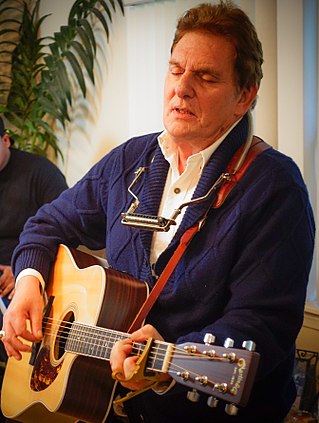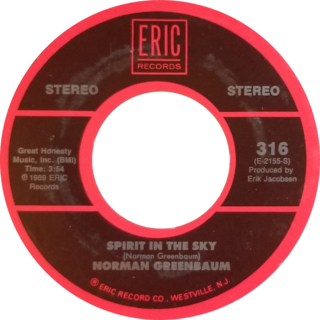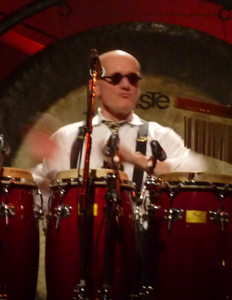Related Research Articles

Creedence Clearwater Revival, commonly abbreviated as CCR, was an American rock band formed in El Cerrito, California. The band initially consisted of lead vocalist, lead guitarist, and primary songwriter John Fogerty, his brother, rhythm guitarist Tom Fogerty, bassist Stu Cook, and drummer Doug Clifford. These members had played together since 1959, first as the Blue Velvets and later as the Golliwogs, before settling on Creedence Clearwater Revival in 1967. The band's most prolific and successful period between 1969 and 1971 produced fourteen consecutive top 10 singles and five consecutive top 10 albums in the United States – two of which, Green River (1969) and Cosmo's Factory (1970), reached number one. The band performed at the 1969 Woodstock festival in Upstate New York, and was the first major act signed to appear there.

Philip Gary "Flip" Sloan, known professionally as P. F. Sloan, was an American singer and songwriter. During the mid-1960s, he wrote, performed, and produced many Billboard Top 20 hits for artists such as Barry McGuire, the Searchers, Jan and Dean, Herman's Hermits, Johnny Rivers, the Grass Roots, the Turtles, and the Mamas and the Papas.

Jona Lewie is an English singer-songwriter and multi-instrumentalist, best known for his 1980 UK hits "You'll Always Find Me in the Kitchen at Parties" and "Stop the Cavalry".
Norman Joel Greenbaum is an American singer-songwriter. He is primarily known for his 1969 song "Spirit in the Sky".

Thomas Richard Fogerty was an American musician, best known as the rhythm guitarist for Creedence Clearwater Revival. He was posthumously inducted into the Rock and Roll Hall of Fame in 1993.

"Spirit in the Sky" is a song by American singer-songwriter Norman Greenbaum, originally written and recorded by Greenbaum and released in late 1969 from the album of the same name. The single became a gold record in the United States, selling two million copies from 1969 to 1970, and reached No. 3 on the US Billboard Hot 100 where it lasted for 15 weeks in the Top 100. Billboard ranked the record the No. 22 song of 1970. It also climbed to No. 1 on the UK, Australian and Canadian charts in 1970. Rolling Stone ranked "Spirit in the Sky" No. 333 on its list of the "500 Greatest Songs of All Time". Cover versions by Doctor and the Medics and Gareth Gates have also made the No. 1 spot in the UK.

Raymond Cooper is an English musician who has worked as a session and road-tour percussionist. During his career, Cooper has worked and toured with numerous musically diverse bands and artists including Elton John, Harry Nilsson, Billy Joel, George Harrison, Paul McCartney, Ringo Starr, Pink Floyd, The Rolling Stones, Eric Clapton, Mark Knopfler, David Gilmour, Roger Waters and Art Garfunkel. Cooper absorbed the influence of rock drummers from the 1960s and 1970s such as Ginger Baker, Carmine Appice and John Bonham.

Henry Gross is an American singer-songwriter best known for his association with the group Sha Na Na and for his hit song, "Shannon". Gross is considered a one-hit wonder artist; none of his other songs reached the Top 10 on the Billboard Hot 100. However, his single "Springtime Mama" was a top 40 hit in the summer of 1976, peaking at #37.

The Sir Douglas Quintet was an American rock band, formed in San Antonio in 1964. With their first hits, they were acclaimed in their home state. When their career was established, the band relocated to the West Coast. Their move coincided with the burgeoning San Francisco psychedelic rock scene of the mid 1960s to early 1970s. Overall, the quintet were exponents of good-times music with strong roots in blues and Texas-regional traditions. The band's songs were most noted for the instantly distinguishable organ sound of Augie Meyers' Vox Continental.
Lawrence William Knechtel was an American keyboard player and bassist who was a member of the Wrecking Crew, a collection of Los Angeles-based session musicians who worked with such renowned artists as Simon & Garfunkel, Duane Eddy, the Beach Boys, the Mamas & the Papas, the Monkees, the Partridge Family, Billy Joel, the Doors, the Byrds, the Grass Roots, Jerry Garcia, and Elvis Presley. He also was a member of the 1970s band Bread.
The Don Harrison Band were a 1970s American roots rock band that featured Don Harrison on vocals, guitar and keyboards, Stu Cook on bass and piano and Doug Clifford on drums and percussion. Stu Cook and Doug "Cosmo" Clifford were both former members of Creedence Clearwater Revival. The line-up also included Russell DaShiell formerly of Crowfoot on lead and rhythm guitar, piano and vocals. The band merged elements of folk, country, rhythm & blues and rock & roll in a sound reminiscent of CCR.
Barney Bentall and the Legendary Hearts are a Canadian rock band, based out of Vancouver, British Columbia that formed in 1980. The band's name was taken from the title of Lou Reed's 1983 album.

George Michael Biondo is a musician who served as bass guitarist of the Canadian rock band Steppenwolf from April 1970 to October 1976. Born in New York, Biondo has been based in Southern California throughout a career as a session musician and songwriter.

Joseph Anthony Vitale is an American singer, songwriter, and multi-instrumentalist. In a career spanning more than 55 years, Vitale has played with many of the top names in music during a career dating back to the 1970s.
Douglas "Doug" Killmer was an American blues and rock bass guitarist active from the 1960s to the late 1990s. He is sometimes credited as Douglas Kilmer or Doug Kilmer. He is best remembered for playing the bass line on Norman Greenbaum's 1970 hit "Spirit in the Sky". In addition to this, he played on the Otis Rush Grammy Award-nominated 1976 song "Right Place, Wrong Time," and Rita Abrams' Grammy-nominated song "Mill Valley." He was active in the San Francisco Bay Area music scene for over three decades.

Myopia is Tom Fogerty's fourth solo album. It was released by Fantasy Records in 1974. The cover painting is called "One Beat of Dove's Wing" by Paul Whitehead.
Crowfoot was an American rock band, initially known as The Beau Gentry. The original line-up featured Russell DaShiell, Doug Killmer and Rick Jaeger.

Cosmo is the first solo studio album by former Creedence Clearwater Revival drummer Doug Clifford, released shortly after that band's breakup.
A.B. Skhy was an American electric blues band from Milwaukee formed in 1968. They recorded two albums before splitting up in the early 1970s.
The Jazz Messengers were a jazz band that existed with varying personnel for 35 years. Their discography consists of 47 studio albums, 21 live albums, 2 soundtracks, 6 compilations, and one boxed set.
References
- 1 2 3 4 5 6 7 8 9 10 11 12 Ruhlmann, William "Russell DaShiell Biography", Allmusic. Retrieved June 29, 2013
- ↑ Accardi, Joseph J. (2008) Beloit's Club Pop House , Arcadia Publishing, ISBN 978-0738552095, p. 96
- ↑ "Album Reviews: Special Merit Picks", Billboard , September 26, 1970, p. 64. Retrieved June 29, 2013
- ↑ "Album Reviews: Crowfoot – Find the Sun", Billboard , October 2, 1971, p. 48. Retrieved June 29, 2013
- ↑ Whitburn, Joel (2009) Music Stars, Record Research Inc., ISBN 978-0898201765, p. 112
- ↑ Lewis, Barbara (1976) "Don Harrison Band Has Hit Single", Lakeland Ledger , June 28, 1976, p. 2D. Retrieved June 29, 2013
- ↑ Salloum, Rod (1978) "Russel DaShiell, Elevator, Epic", Star Phoenix , April 15, 1978, p. 8 (Accent section). Retrieved June 29, 2013
- 1 2 Dupler, Steven (1985) "Audio Track", Billboard , March 9, 1985, p. 43. Retrieved June 29, 2013